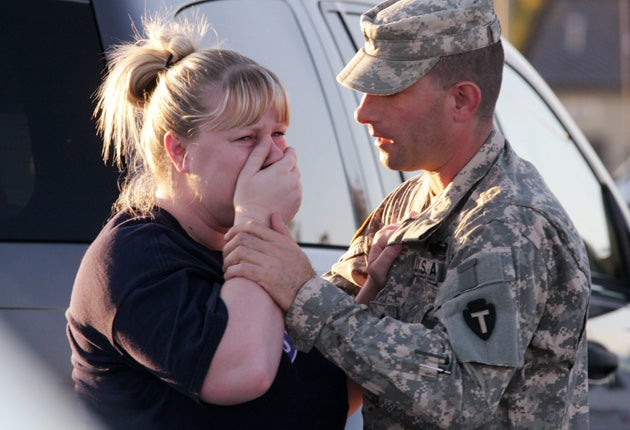'People were off guard in the base'

It is in the heart of Texas gun country, but Ford Hood is the last place one would expect a massacre to take place, said a former British Army officer who served in the vast military base.
Major Jim Panton, an Apache pilot, was based in Fort Hood for almost three years. "The surrounding areas had a very strong gun culture," he said yesterday. "People felt it was their constitutional right to bear arms.
"When I heard about the killings I was utterly shocked. It may seem ironic but the army base was the one location where one did not see people carrying guns around apart from those who were on specific duties requiring arms. You felt pretty safe – you always felt that you were in the safest place one could be in uniform. People had got back there from Afghanistan and Iraq and they would have been relaxed after serving in the war zones – they wouldn't have been on their guard."
Major Panton, of the Army Air Corps, painted a vivid picture of the camp. "There are about 45,000 troops stationed there, almost half the size of the British Army," he said. "The base is simply too big to be claustrophobic. The other end of the camp was so far from our house that it was easier to leave camp, get on the motorway, and then get off after two junctions."
He said that the Soldier Readiness Centre, where the shootings took place, is "about the size of a football field. There would have been hundreds of people there who have either just returned from combat duties or were about to be deployed.
"It is remarkable that in the space of 48 hours we have had two such incidents – we had the soldiers killed by the Afghan policeman in Helmand and now this. In both instances someone trusted as being on the same side has turned out to be the enemy."
Major Panton, 40, who had served in Bosnia, is now the chief executive of Erskine, a military charity based in Scotland which helps service personnel affected by combat-related trauma. He pointed out that Major Nidal Malik Hasan, the psychiatrist accused over the shooting spree, would have listened to the hundreds of soldiers suffering from similar conditions in his job.
"It is not generally realised but carers need care too. Trauma is transferable, and being exposed to it for prolonged periods, day after day, can have a damaging effect. It may well be that the motivation of this man was political. But there are underlying factors which can trigger such extreme violence and one of them is continuously listening to stories of violence."
Subscribe to Independent Premium to bookmark this article
Want to bookmark your favourite articles and stories to read or reference later? Start your Independent Premium subscription today.

Join our commenting forum
Join thought-provoking conversations, follow other Independent readers and see their replies